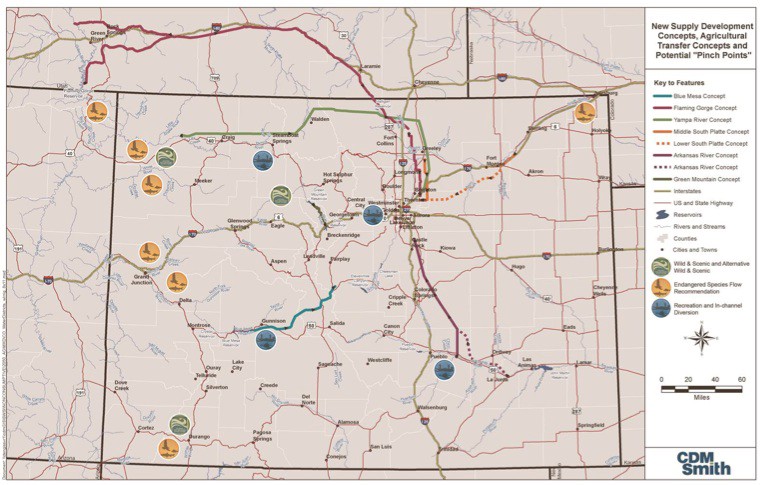Republicans from arid Western states have set their sights on making dam-building easier. Led by California Representative Tom McClintock, lawmakers from Wyoming, North Dakota, Arizona, and Colorado introduced a bill last week that would try to force federal agencies to complete complex environmental studies for dam-building plans within a year.
But many water scientists, river law experts, and regulators say House Resolution 1664, which is sponsored by California Republican Congressman Tom McClintock, presents an unrealistic timeframe given that any major modern dam proposal includes dozens of detailed scientific, engineering, and safety studies running to thousands of pages. Conservation advocates say the bill would undermine basic environmental laws requiring federal agencies to take a “hard look” at proposed projects on public land.
McClintock, whose 4th Congressional District encompasses many of the rivers flowing out of the Sierra Nevada Mountains, has long claimed that new dams and pipelines are needed to address persistent water shortages in California and the West—a position at odds with science showing that many new reservoirs are likely to wind up costly boondoggles in the climate change era.
That didn’t stop a few other lawmakers from around the West from joining McClintock’s cause. Co-sponsors of the bill include Representative Darrell Issa and Colorado’s Scott Tipton, who has never met a dam he didn’t like, and who has backed private water grabs on streams originating on public national forest lands.
“It takes significant amounts of time to analyze and understand the enormous environmental impacts that dams wreak on our rivers and environment. Trying to truncate that process is anti-science, anti-environment, and undermines the public’s trust as well as current federal law.”
The bill was introduced in the House on March 21st, flying under the cover of news around possible links between the Trump administration and Russian intelligence services and the sudden withdrawal of the Obamacare repeal bill.
The lack of attention aside, McClintock’s bill marks the GOP’s first foray into the world of Western water issues since President Donald Trump took office, and if passed would be a monumental blow to rivers across the region, according to conservation advocate Gary Wockner, a board member of the Waterkeeper Alliance.
“This … is a river-destruction bill at its heart. It takes significant amounts of time to analyze and understand the enormous environmental impacts that dams wreak on our rivers and environment. Trying to truncate that process is anti-science, anti-environment, and undermines the public’s trust as well as current federal law,” Wockner says.

In Colorado, Denver Water has been trying for eight years to win federal permission for expanded diversions and storage of Colorado River water. Downstream, Utah, Nevada, and Arizona would also like to siphon off more of the river’s flows for additional unsustainable growth in desert cities, and, in California, the measure could help water buffaloes win approval of the proposed 275-foot-high Centennial Dam along the Bear River, as well as other water development projects favored by agri-businesses and real estate developers.
There are convincing arguments for increasing water storage in the West, with some new reservoir proponents touting projects that could, if conceived and operated properly, have environmental benefits, including healthier flows for fish and reliable supplies for local agriculture. But cutting environmental studies is not the way to achieve those goals.
The measure doesn’t spell out what would happen if the deadline is not met, or any other enforcement measures, leading Wockner to believe that it’s either poorly conceived, or is merely a first step in a prolonged assault, testing the waters, so to say, for future companion measures that would have sharper teeth.
That would be similar to GOP efforts to weaken the Endangered Species Act on a piecemeal basis. There’s a good reason Republicans have never taken a head-on approach to opposing environmental protections — the country’s bedrock environmental laws, including the ESA and the Clean Water Act, have widespread popular support, so trying to openly dismantle them would be politically dangerous.
At issue in McClintock’s dam-building bill is the National Environmental Policy Act, a federal law requiring in-depth analysis and public disclosure of the environmental effects brought about by actions on public lands. The NEPA also ensures public participation in the review process. Wockner said the measure would gut the law, similar to how reviews for forest logging projects were accelerated under the Bush administration in response to a so-called forest health crisis.
Many climate change studies suggest that the warmer and drier conditions expected in the decades ahead mean there won’t be enough water to consistently fill any new reservoirs. River advocates say increased conservation efforts and smart water management are the best way to prepare for a future shaped by climate change. Recent studies have also tabbed reservoirs as significant sources of greenhouse gas emissions, especially methane, meaning that new storage proposals could exacerbate the problem they’re aimed at solving.
Given the roiling political atmosphere in Congress, it’s not clear whether the bill has any chance of passing in anything close to its present form. But it does seem clear that the GOP has no intention of backing away from its anti-environmental agenda — if anything, the controversies over higher-profile issues could provide political cover for bills like McClintock’s. That means activists and citizens have to remain watchful, Wockner warns.




